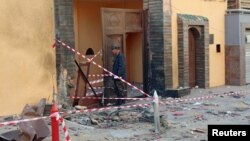The United States and European powers are pressing Libya's rival factions for an "unconditional" cease-fire as talks aimed at creating a unity government start Monday in Algeria.
The violence that has persisted in Libya since the 2011 ouster of long-time leader Moammar Gadhafi erupted again Monday, however, with a bomb exploding outside the Moroccan embassy in Tripoli. There were no casualties, but cars were damaged.
The bombing came hours after gunmen opened fire on the South Korean embassy compound, killing two Libyan guards and wounding a third person.
Islamic State militants claimed responsibility for both attacks.
Seeking a solution
Libyan political parties were due to meet in Algeria as U.S. Secretary of State John Kerry and his counterparts from five European nations urge rival factions to finalize a unity government and stop the violence.
In a joint statement Sunday, Kerry and the foreign ministers of Britain, France, Germany, Italy and Spain welcomed Monday's talks and a U.N.-led meeting Wednesday in Morocco.
They called for an immediate end to airstrikes and ground fighting in Libya, where parallel governments have been clashing for power, and threatened sanctions against those threatening the country's peace and security.
"Now is the time for all groups in Libya to move forward in a spirit of compromise," the ministers said. "Further delay in reaching a political agreement only deepens the schisms in Libyan society and emboldens those who seek to profit from the ongoing conflict."
The statement also highlighted the threat of terrorism in Libya, saying militants there are using the political instability to cause suffering within and outside Libya.
The diplomats said "only through compromise can Libya move toward a more secure, stable and prosperous future."
Islamic State militants claimed responsibility for an attack Sunday on the South Korean embassy in Tripoli that killed two people. On Monday, a bomb exploded outside the Moroccan embassy in the city.

